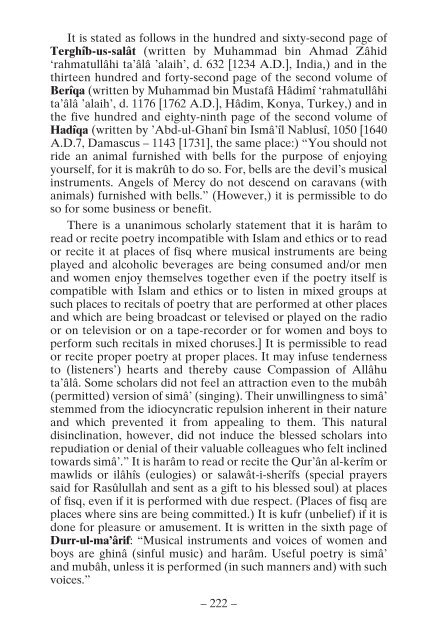Miftah-ul-Janna (Booklet for way to Paradise)
You also want an ePaper? Increase the reach of your titles
YUMPU automatically turns print PDFs into web optimized ePapers that Google loves.
It is stated as follows in the hundred and sixty-second page of<br />
Terghîb-us-salât (written by Muhammad bin Ahmad Zâhid<br />
‘rahmat<strong>ul</strong>lâhi ta’âlâ ’alaih’, d. 632 [1234 A.D.], India,) and in the<br />
thirteen hundred and <strong>for</strong>ty-second page of the second volume of<br />
Berîqa (written by Muhammad bin Mustafâ Hâdimî ‘rahmat<strong>ul</strong>lâhi<br />
ta’âlâ ’alaih’, d. 1176 [1762 A.D.], Hâdim, Konya, Turkey,) and in<br />
the five hundred and eighty-ninth page of the second volume of<br />
Hadîqa (written by ’Abd-<strong>ul</strong>-Ghanî bin Ismâ’îl Nablusî, 1050 [1640<br />
A.D.7, Damascus – 1143 [1731], the same place:) “You sho<strong>ul</strong>d not<br />
ride an animal furnished with bells <strong>for</strong> the purpose of enjoying<br />
yourself, <strong>for</strong> it is makrûh <strong>to</strong> do so. For, bells are the devil’s musical<br />
instruments. Angels of Mercy do not descend on caravans (with<br />
animals) furnished with bells.” (However,) it is permissible <strong>to</strong> do<br />
so <strong>for</strong> some business or benefit.<br />
There is a unanimous scholarly statement that it is harâm <strong>to</strong><br />
read or recite poetry incompatible with Islam and ethics or <strong>to</strong> read<br />
or recite it at places of fisq where musical instruments are being<br />
played and alcoholic beverages are being consumed and/or men<br />
and women enjoy themselves <strong>to</strong>gether even if the poetry itself is<br />
compatible with Islam and ethics or <strong>to</strong> listen in mixed groups at<br />
such places <strong>to</strong> recitals of poetry that are per<strong>for</strong>med at other places<br />
and which are being broadcast or televised or played on the radio<br />
or on television or on a tape-recorder or <strong>for</strong> women and boys <strong>to</strong><br />
per<strong>for</strong>m such recitals in mixed choruses.] It is permissible <strong>to</strong> read<br />
or recite proper poetry at proper places. It may infuse tenderness<br />
<strong>to</strong> (listeners’) hearts and thereby cause Compassion of Allâhu<br />
ta’âlâ. Some scholars did not feel an attraction even <strong>to</strong> the mubâh<br />
(permitted) version of simâ’ (singing). Their unwillingness <strong>to</strong> simâ’<br />
stemmed from the idiocyncratic rep<strong>ul</strong>sion inherent in their nature<br />
and which prevented it from appealing <strong>to</strong> them. This natural<br />
disinclination, however, did not induce the blessed scholars in<strong>to</strong><br />
repudiation or denial of their valuable colleagues who felt inclined<br />
<strong>to</strong>wards simâ’.” It is harâm <strong>to</strong> read or recite the Qur’ân al-kerîm or<br />
mawlids or ilâhîs (e<strong>ul</strong>ogies) or salawât-i-sherîfs (special prayers<br />
said <strong>for</strong> Rasûl<strong>ul</strong>lah and sent as a gift <strong>to</strong> his blessed so<strong>ul</strong>) at places<br />
of fisq, even if it is per<strong>for</strong>med with due respect. (Places of fisq are<br />
places where sins are being committed.) It is kufr (unbelief) if it is<br />
done <strong>for</strong> pleasure or amusement. It is written in the sixth page of<br />
Durr-<strong>ul</strong>-ma’ârif: “Musical instruments and voices of women and<br />
boys are ghinâ (sinf<strong>ul</strong> music) and harâm. Usef<strong>ul</strong> poetry is simâ’<br />
and mubâh, unless it is per<strong>for</strong>med (in such manners and) with such<br />
voices.”<br />
– 222 –

















